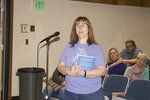The Chimacum School Board intended to listen to concerns of parents May 13, but instead was peppered with questions about student discipline and academic issues, and asked to take action, not just …
This item is available in full to subscribers.
We have recently launched a new and improved website. To continue reading, you will need to either log into your subscriber account, or purchase a new subscription.
If you had an active account on our previous website, then you have an account here. Simply reset your password to regain access to your account.
If you did not have an account on our previous website, but are a current print subscriber, click here to set up your website account.
Otherwise, click here to view your options for subscribing.
* Having trouble? Call our circulation department at 360-385-2900, or email our support.
Please log in to continue |
|



The Chimacum School Board intended to listen to concerns of parents May 13, but instead was peppered with questions about student discipline and academic issues, and asked to take action, not just listen.
The board presented the Saturday-morning event in the Chimacum High School auditorium as a “special forum for local citizens,” during which board members and the superintendent could receive public comments on what the district itself acknowledged has been poor student performance.
Dozens of parents, volunteers and concerned community members without children in the district expanded the event’s stated focus on low scholastic achievement to include student behavioral issues.
Board chair Mike Gould summed up the prevailing themes of the attendees’ comments as concerns with the schools’ discipline and culture, and pledged that the board’s next available workshop meeting, at 6 p.m. on Wednesday, June 14, would be devoted specifically to developing “on-the-ground solutions.”
ENDANGERED?
Port Ludlow’s Jared Shepherd was the first of several parents to express fears for their children’s safety at the hands of other students, and asked Gould to elaborate on district policy in instances of student misbehavior. Although Gould had not planned to respond to audience questions, he noted that such school policies are posted online at the district’s website.
Kelly Pearson, an employee of the Peninsula School District, has three grandchildren whom she is likewise reluctant to see enrolled in the Chimacum School District. That reluctance stems from test scores she deems “beyond abysmal,” especially in third-grade reading, not only in comparison to the statewide average, but also compared to the Port Townsend and North Kitsap districts.
“Reading is so very important for our children,” Pearson said. “From kindergarten through third grade, they’re learning to read, but from fourth grade forward, they’re reading to learn. Everything shifts at that point, and if they’re not reading at grade level, their chances of graduating from high school plummet to virtually zero.”
As an employee of another school district, Pearson questioned what Chimacum was doing with its Title I and II funds.
As a former employee of the Chimacum School District, four-year para-educator Shaunte Brown accused the district of providing insufficient support to teachers and other school staff dealing with what she identified as significant behavioral issues on the part of several students.
‘TEACHERS NEED HELP’
“I’m worried for the safety of the teachers and the other children,” said Brown, who criticized what she sees as a lack of discipline, either at school or in students’ homes, enabling “acts of abuse” by ill-behaving children, including throwing chairs. “If we can’t make them do work, rather than just sitting there, why can’t we send them home?”
Brown said she was terminated from the school district a few weeks before, after leaving her shift early one day, in the wake of what she said were daily tantrums by certain students.
“Teachers don’t want to give up,” Brown said, “but they need help.”
Port Ludlow’s Jane Armstrong, a volunteer with no children of her own in the district, took pains to praise what she sees as improvements in the district’s third-grade math scores, and she encouraged the district to build on this success with a continued focus on science, technology, engineering and math (STEM) subjects.
At the same time, Armstrong acknowledged that “today’s teachers face challenges that weren’t there when I was in school,” and lamented the fact that money earned from summer jobs is no longer enough for students to pay for college.
Doug Henderson, a 13-year Port Ludlow resident who’s followed Chimacum schools for the past two of those years, brandished thick manila folders containing information he described as documenting “all the things that are wrong with this school district,” about which he wanted to engage district officials in dialogue.
“It doesn’t help to document these things if no one will talk to you about them, or if you submit these problems to the school board and nothing is done about them,” said Henderson, who cited “dysfunctional families” and poorly prioritized spending as the chief culprits. “This is not a ghetto. We have money. We just got a levy. We’re not using it to create a level playing field to start with.”
Lindsey Boltinghouse expressed her support for Brown and Shepherd, recounting incidents such as two children leading as many as 10 faculty members on a chase as they ran from the school buildings; and a bus that was delayed for 15 minutes because a child refused to board unless it was parked at “the right spot.”
“How often do you go to the primary school?” Boltinghouse asked Superintendent Rick Thompson. “I got a sitter for my kids so I could come here this morning. I need to know, what is your idea of discipline?”
“We’re trying our best to answer that,” said Gould, who suggested that the district could conduct another session devoted specifically to student discipline.
“I don’t feel like you are, though,” Boltinghouse replied.
FARM-TO-SCHOOL INVESTMENT
Linda Boyd, a 28-year employee of the Chimacum School District, and Abby Jorgensen, speaking on behalf of the Port Townsend–based nonprofit Community Wellness Project, both see green gardens as one possible way of getting Chimacum kids more invested in their schools.
With two children already through the Chimacum school system, and a grandson on the way, Boyd advocated on behalf of farm-to-school programs, such as horticulture classes, while Jorgensen suggested that Chimacum teachers could apply for small project grants for garden troughs and other programs to promote healthy eating.
“We want to support creative ideas,” Jorgensen said.
“By the time our kids reach high school, they need to be educated enough to know what they want to do after they graduate,” Boyd added. “We need to show them everything that’s out there. I love [Armstrong’s] idea of bringing folks in from the community to show our students some of the options they have.”
Heidi Jefferson-Johnson, a parent and teacher with the Chimacum School District, echoed this idea, noting the number of outside organizations the district has already enlisted in helping to educate their students, including Seattle’s Museum of Flight.
“We want the best for your children, because they’re our children as well,” said Jefferson-Johnson, who has two sons in the district. She proudly touted the district’s number of extracurricular events, including Parent Nights and Literacy Nights, while also emphasizing the need to teach keyboarding skills to students, since so many standardized tests are now conducted digitally.
‘NEGATIVITY’ AND SOLUTIONS
Paul Moseley, a Port Ludlow parent of two children in the district, was effusive in his praise of not only the district’s teachers, but also the multiage class system that’s been available to his kids.
“They’ve grown up well in that environment, due to its mentorship,” Moseley said. “When one of my kids told me about another kid who was being bad, I said, ‘Well, you’re the example.’ You have third-graders who are being mentored by fourth- and fifth-graders, who think of them as their buddies.”
Moseley expressed concerns about “the negativity going forward” reported by other parents, as well as with the grading scale, which differed from the system used when he was growing up.
Crystie Kisler, co-owner of Finnriver Farm & Cidery and a teacher for 15 years as well as the parent of an eight-grader in the district, recommended that local employers use students as employees more often, not only to develop and benefit from their skills, but also to help “tell positive stories” about the community’s youth.
As a former schoolteacher, Eric Jorgensen freely conceded that finding solutions to school problems can be “tricky” and “take some time,” but as the parent of two kids heading into high school, he remains concerned with the vacant administrative assistant position at the high school.
“We have a new principal coming from outside the district,” Eric Jorgensen said. “They won’t have an assistant who’s been here. I’m worried about a potential vacuum in leadership.”
‘GOING IN CIRCLES’
Fellow parent Kelly Liske was the first attendee, but not the last, to assert that Chimacum schools have been going on circles about these issues for a while now.
“I’ve been to several of these events,” Liske said. “I think you’ve heard our feedback. Half the people in this room have already shared it. I’m not hearing anything new. I’m not seeing any accountability or action. Talk is cheap. Nothing is happening. If four of the board members are up for re-election, are we going to have to have this conversation all over again, because we’ve been having it since my daughter was in kindergarten.
“I chose Chimacum,” she concluded. “Today, I feel like I made a bad decision.”
Melissa Davis has seen her daughter attend Chimacum schools and become a teacher in the district, and she was even more exasperated.
“The teachers are amazing, but it’s appalling for me to have to sit here and hear the same things we talked about 15 years ago,” Davis said.
Port Ludlow resident Bert Loomis said he has been studying the district since 2011, and expanded on Henderson’s suggestions regarding the district’s budget by urging officials to surplus unused properties in favor of improving thefacilities that the schools actually need.
“Student enrollment is declining,” Loomis said. “We’re one of the oldest counties in the country. We’re not looking at getting another wave of new children for at least 20-25 years. We should consolidate the resources we have for the long-term benefit of our current children. We don’t need more bond money for buildings we don’t use. That’s bad management.”
David Goudie, also from Port Ludlow, challenged the school board and superintendent to turn their “pencil writing and note taking” into concrete, well-defined action items, complete with deadline dates.
“Otherwise, people might say they’re going to get back to you with answers, but it never happens,” Goudie said.
ENLISTING OUTSIDE AID
Becky Turner, president of Chimacum’s K-5 PTA, listed a few of the many programs that her group had helped fund, from Kindles and whiteboards and field trips to music programs, science grants and partnerships with Seattle’s Pacific Science Center, before she began shedding tears.
“I’m sorry, but if I’m emotional, it’s because I see our schools failing,” Turner said.
Adele Govert volunteered not only herself, but also a number of her fellow Port Ludlow retirees, to contribute to the Chimacum schools.
“I have so many friends who are looking for something to do,” Govert said. “If your students get better results in school, we’ll get better people moving to the community. What can we do for you? Tell us!”
Mona Burton sounded a similar note to try to enlist more fathers and male guardians to help supervise the school playgrounds.
“You don’t have to be there the whole day,” Burton said. “We need positive male role models. We have a large amount of kids out there during recess, and they love it when dads are there. You can do it once a week, or once a month.”
LISTENING, BUT NOT HEARD
After everyone in attendance who wished to do so had the opportunity to speak once, Thompson and the school board offered their own remarks.
Thompson engaged Boltinghouse in a conversation about student discipline, citing legislative restrictions of “the tools available to us,” while still acknowledging the need to outline the district’s disciplinary methods more clearly, and foster better communication between the district and the community overall.
“The teachers and principals are great,” Boltinghouse said. “They’re just not getting any backup.”
Although she wouldn’t classify it as a disciplinary issue, Boltinghouse added that a student in her son’s class isn’t toilet-trained, so every 30 minutes, the teacher has to remind the student to go to the bathroom.
“Otherwise, they just pee in their chair,” Boltinghouse said. “My son is told just to ignore this. I’m not happy that he has to witness this every day.”
As Brown waited to speak a second time, to voice her objections to the way in which she was terminated, the board members each agreed on the need to listen to the community and take action. Moseley, however, found that their conduct belied their expressed intentions.
“The fact that you’re not letting her speak before you give your closing statements tells me you’re not listening,” said Moseley, who walked out of the auditorium.